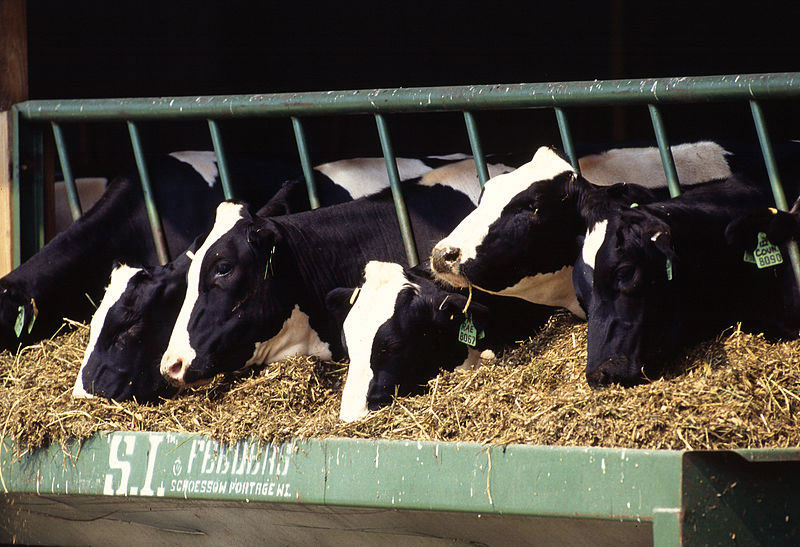
The NFU has taken the battle to protect the UK’s dairy farmers to Europe as further price cuts and market volatility risk threatening the industry.
A former chairman of the Farmers' Union of Wales milk and dairy produce committee has expressed frustration at the significant cuts in the price farmers are to be paid for their milk.
Dairy Crest said the price reductions reflect 'dramatic falls in global dairy markets over the past few weeks,' including the Russian trade ban on dairy products.
Müller said the reduction of 1.8ppl reflects a sustained decline in revenues generated from sales of butter and cream, commodities which are traded in global markets.
NFU dairy board chairman Rob Harrison is urging European dairy farmer representatives, traders and European Commission officials to agree fair proposals for private storage aid as well as robust ways to limit the impact of falling commodity prices and the recent Russian import ban on dairy products.
“It is vital that I can represent UK dairy farmers in Brussels and push for appropriate and relevant action from the European Commission, in response to the critical price collapse we’ve seen in dairy commodity values,” said Mr Harrison.
“I am calling for four things to be done which could help secure the short and long-term viability of our dairy industry, including private storage aid measures to include cheese as well as skimmed milk powder and butter; for product to be kept in store for at least a year to reduce the risk of collapsing the market while the Russian ban is still in effect; for the Commission to focus on promotion of EU dairy products in important growing export markets; and for the commission to investigate ways to release product from storage, that minimises the impact on the domestic market place.
“Creating a commercial and political environment in which British dairy farmers can compete globally has always been the focus of the NFU. In July 2013 we launched ‘Compete to Grow’, our vision for the future of the dairy industry. At that time farmers were receiving market signals and favourable conditions to grow their output. Despite this growth, the UK market is still in deficit and below its quota ceiling. Depressed prices now are a result of wider global factors, which have depressed global commodity values.
“Compete to Grow challenges the entire UK dairy supply chain to seize the opportunities for global market growth that lie ahead by ensuring our industry is competitive and seeking new markets. These principles are echoed by the UK dairy industry’s ‘Leading the Way’ strategy, which is endorsed by around 50 dairy organisations, processors, retailers, banks and consultants.”
First Milk’s announcement that it will be cutting the price for both its liquid and manufacturing pools by 3ppl from 1 October will be a major blow to its 250 Cumbrian dairy farmer suppliers, the NFU has warned. The price drop will also have an effect on producers in Lancashire and Cheshire.
Many NFU members supply First Milk’s Lake District Creamery at Aspatria in Wigton - the home of its Lake District Dairy Co brand. The site is also a major producer of whey protein products. The NFU has been told this decrease will take First Milk’s standard price down to 26.1ppl but the cooperative points out that it expects producers to earn more than that by producing good quality milk.
NFU’s North West Dairy Adviser Adam Briggs, said: “We had hoped the price would stay above 30ppl so of course it is very disappointing to see Cumbrian farmers taking the hit. They need to see profitable reward for quality milk.
“Trust within the supply chain, founded on decent contracts and a fairer share of margins, still has to be seen as the way forward and we are speaking with members about the latest situation as it develops.”
First Milk has told the NFU that a number of factors have led to the decrease in price, including increased domestic and global supply coupled with a reduction in demand from main importing markets. On top of this we have now seen Russia banning dairy imports from the EU. Given that most of First Milk’s milk is manufactured into products like skimmed milk powder, cheese, butter and cream, which are traded globally, it is impacted directly or indirectly by all these market factors.
Adam added: “If dairy farmers are to invest it needs to happen through fair, sustainable prices and cuts always impact at farm gate, where the profit margins are much lower.
“A fair level of profit is needed throughout the whole supply chain from farm to supermarket shelf.”
Former FUW milk and dairy produce committee chairman Eifion Huws who runs a dairy farm at Bodedern on Anglesey, said: "We are frustrated that milk prices are once again plummeting just as the industry is beginning to gain the confidence it needed to invest in a better future."
"These price cuts are unsustainable and will have a serious impact on members cash flow.
“The volatility in the global dairy market is well documented and the Russian trade embargo will no doubt exacerbate the continuing fall in global and European dairy markets.
“Russia imports less than one percent of the UK’s cheese, butter and skimmed milk powder, however the loss of trade for bigger exporters such as Germany and the Netherlands could cause downward pressure on prices through an increase in available supply,” added Mr Huws.
